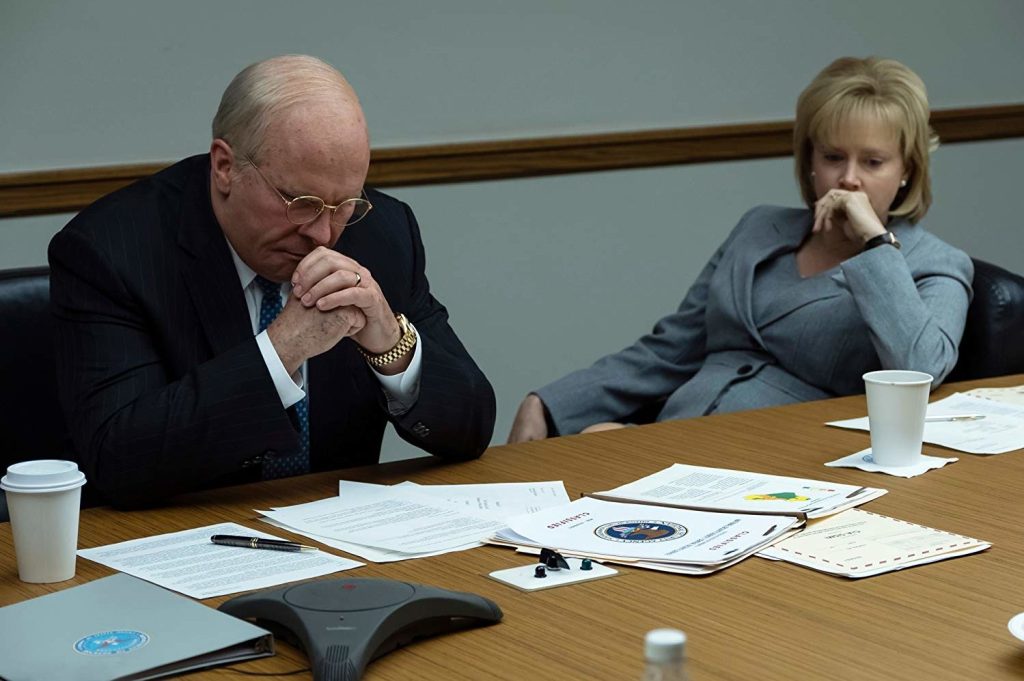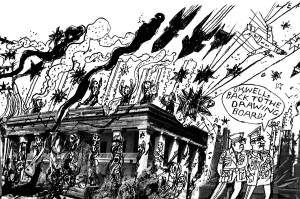As a study in political power, Adam McKay’s Vice resembles a slow day in the Oval Office of Bill Clinton: close, but no cigar. The fault is in the stars. Not in Amy Adams and Christian Bale, both of whom are wonderful as the modern Macbeths, Dick and Lynne Cheney, but in the casting of Steve Carell as Donald Rumsfeld, and in the intrusions of McKay’s technical and political vanity.
Every time Bale’s Cheney tiptoes gruntingly towards power like one of the ballerina pink elephants in Dumbo, either Carell shows his teeth and snickers like a hyena, or McKay winks through the fourth wall via Kurt, Jesse Plemons’s supremely smug and irritating narrator. Plemons affects Hollywood Everyman by wearing an ugly plaid shirt, two days’ stubble, and political opinions that are about as rare as a pink elephant. Kurt is Gramsci’s ‘organic intellectual’, the worker who arrives at socialism by experience, rather than going to college. We are reminded of the depth of Kurt’s historical understanding, and the shallowness of McKay’s technique, by idiot voice-over lines like, ‘It was the fucking Eighties.’
Macbeth has the same problem. Just as the blood is starting to run, a drunken porter delivers a comic soliloquy. But the porter only appears once. He is probably a crowd-pleasing addition to Shakespeare’s play, written by someone else, and inserted into the script to keep the viewers happy. But Kurt keeps coming back for less. He won’t shut up, and his sanctimonious whining is all McKay’s own work. Instead of Macbeth’s whiff of sulphur, we get the sweat of fratboy irony that McKay carries from Saturday Night Live and Anchorman.
The joke here is that Christian Bale’s Cheney really is an organic intellectual. Cheney, codenamed ‘Angler’, is intuitive, careful and patient as he lays his lure and moves over the slippery rocks in pursuit of the big fish. He doesn’t learn politics in his brief time at Yale — exit, flecked with vomit — but on the job, first as a Congressional intern with Donald Rumsfeld, then as Gerald Ford’s chief of staff, the youngest in American history; and again as the CEO of Halliburton.
It was experience, not theory, that allowed Cheney to recommend himself as George W. Bush’s running mate, and then to reshape the vice-presidency from ornament to traffic cop, controlling the intersections of the bureaucracy. It was experience that taught Cheney the art of the legal sidestep and the bureaucratic block-tackle, and how to probe the weak seam between executive and legislature. It was experience, not theory, that confirmed that Americans value security more than liberty. It was also experience that convinced him that invading Iraq was a good idea. Cheney was not a theoretician of democracy. He believed in the expansion of American power. Clever Dick.
Cleverer Lynne. In McKay’s telling, Cheney’s vice, the lust for power, derives from his lust for Lynne. We see plenty of bodies and body parts in Vice, charred Iraqis and Cheney’s heart-transplant procedure among them, but there is no scene in which Dick is pinned James Bond-style by Lynne’s vice-like thighs. Still, the nylon crackles between Bale and Adams. Her ‘vaulting ambition’ is the power behind the power behind the empty throne of the second Bush administration.
In The Big Short, McKay used jokey narrations to camera to explain the workings of the stock market. In Vice, this method short-circuits the script. A stock market is a mechanism, but Cheney, despite Bale’s ponderous and implacable march through the institutions, is a human being. Macbeth is tragic because we know that he is driven by more than lust for power. When McKay plays the drunken porter, it is because he fears that we will understand Cheney too well, and pardon him accordingly.
Tolstoy wrote that we use ‘power’ to describe the causes and effects that we cannot describe by any other name. Vice fails to connect the effects of power to their causes. We see Cheney as a hard-working, principled family man, but are told he is like Galactus from the Fantastic Four, a fantasy of power unlimited. We see that Cheney rose to the occasion in the situation room after the 9/11 attacks, but are told that this was a Macbeth-style theft of power by a comic villain.
‘We can’t just snap into a Shakespearean soliloquy that dramatizes every feeling and motivation,’ Kurt says when Cheney decides to accept Bush’s offer to run as his vice-president. ‘That’s just not the way the world works.’ But it is the way that mature art works. McKay admits as much when he gives Dick and Lynne a mock-Shakespearean interlude in which they go full Macbeth. Their lines are a shoddy approximation — McKay is a Monty Python fan — but enough to convince some buffoon from NPR that they are taken from Macbeth.
Enough too to affirm the virtue that McKay and his target audience already believe they possess. But not enough to explain why Cheney is possessed of uniquely evil superpowers. Vice’s failures of tone, its shifting to cartoon and comedy, are failures of nerve and intellect. The recourse to crudity in language and slapstick in delivery are reflexes that protect prejudice and serve the ideal of demonization. But this policing of our reactions does little to deepen our understanding of Cheney’s motives, let alone explain how he became the pivot for the most catastrophic policy decisions since Vietnam.
Adams and Bale deserve the Oscar nominations they will surely receive, but whether that allows Vice to recoup its $60m budget is another matter. If you already hate Dick Cheney unconditionally, you don’t need to see Vice. If you are one of the few people who like him, you won’t want to see it. And if you are one of the many hoping to understand how we got here from there after 9/11, Vice won’t show you. It certainly won’t address the questions that are modern America’s equivalent of the scholars’ debate over how many sons Macbeth had: Was Barack Obama’s snooping, drone-striking administration the son of Bush by Cheney? And does the reversal of a militarized foreign policy by Donald Trump, scion of Scotland, contain the possibility of escape from the predicament of power?
Instead, McKay will massage away the tragedy of modern America by juvenile comedy. Here, McKay shows the truth despite his best efforts. Vice demonstrates that Cheney was able to achieve so much, and do so much damage, because he was an adult in an increasingly childish culture. In a society that has turned politics into a beauty contest, Cheney was a slob who didn’t care if he looked ugly. In a society where adults read comic books, Cheney took the trouble to study the mechanisms of law and governance. In a society that admires power, Cheney learnt how to use it.
‘I am in blood stepped in so far,’ Macbeth says, ‘that should I wade no more, returning were as tedious as go o’er.’ Vice loses the spoor of Cheney’s footsteps, which run across the trails of both parties, and prefers to go over cartoon villainies and virtues. When Kurt tells us that environmental and social disaster was Cheney’s work and legacy, we are shown that dreams of apocalypse are, at least for true believers, an escape into a catastrophic kind of happy ending. But happy endings are only for Hollywood, for massage parlors, and for Bill Clinton.
Dominic Green is Life & Arts Editor of Spectator USA.


















